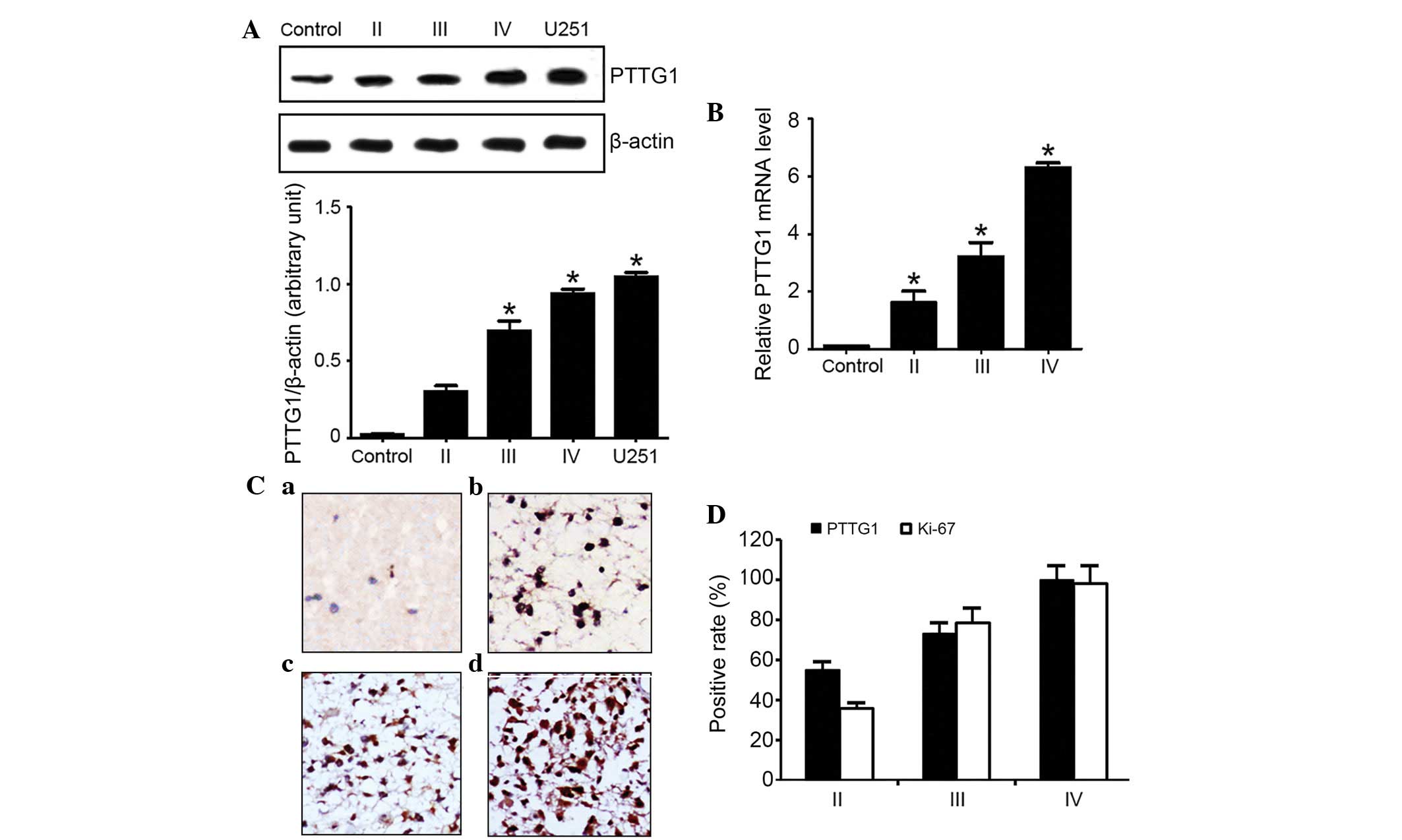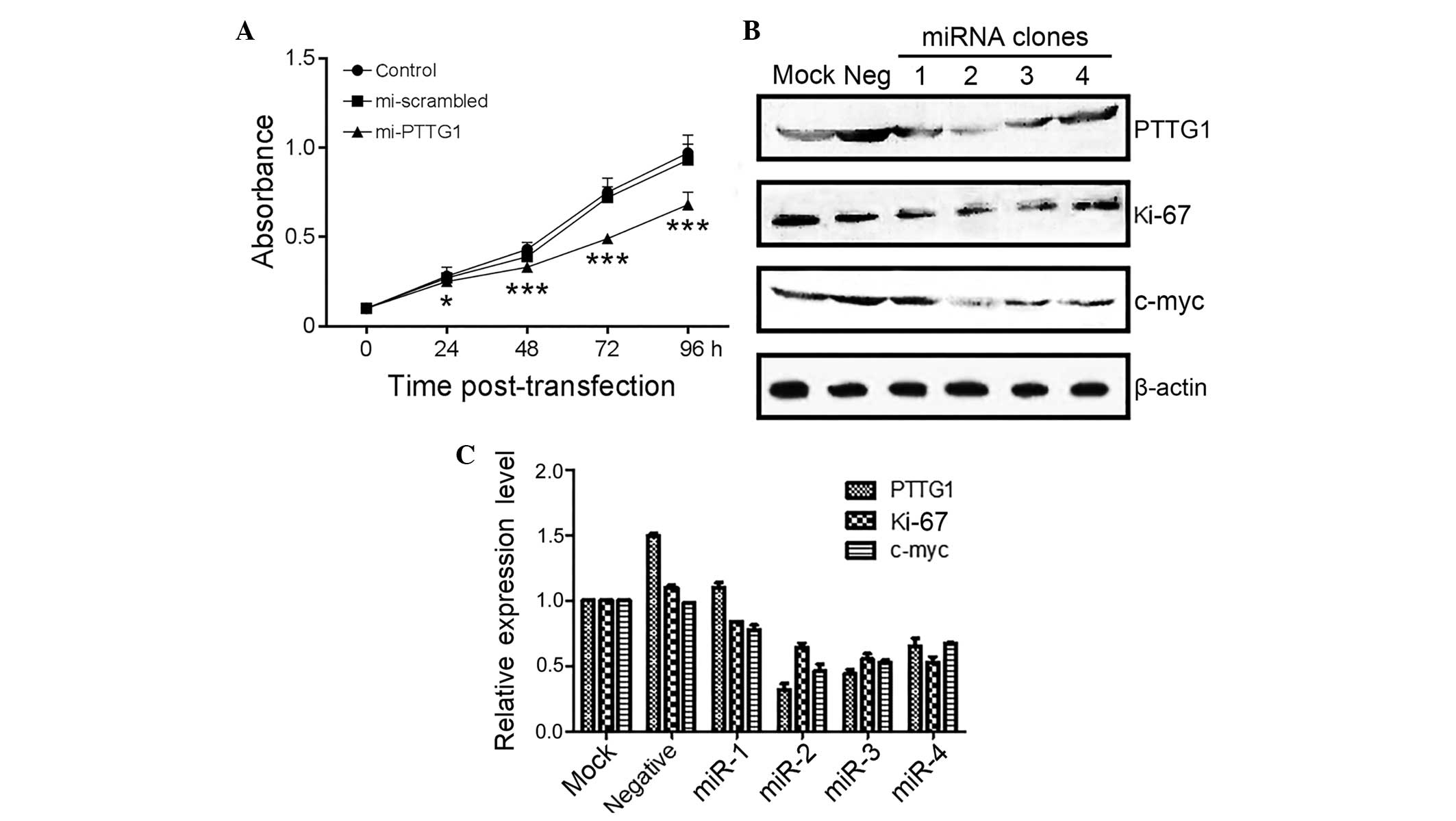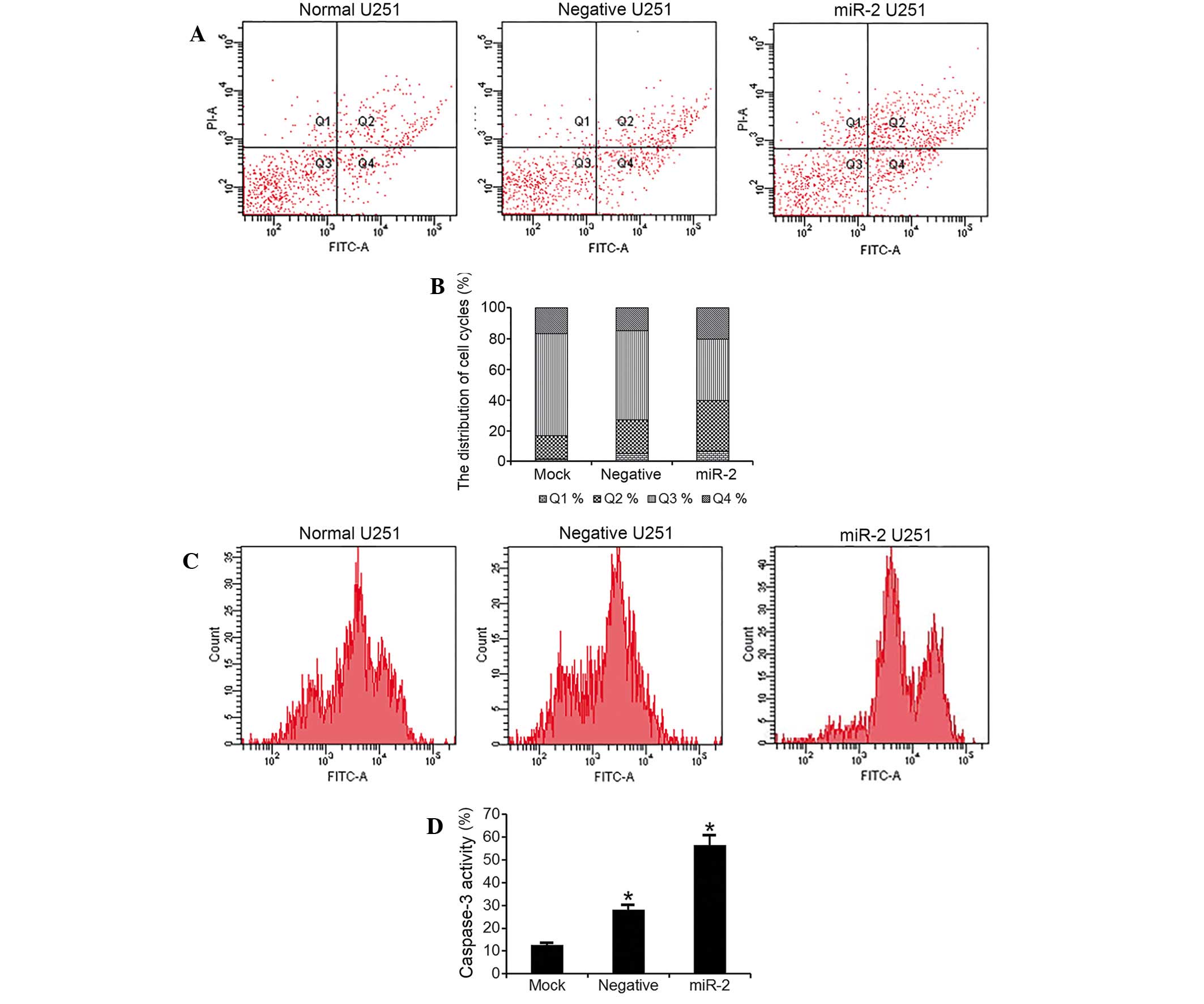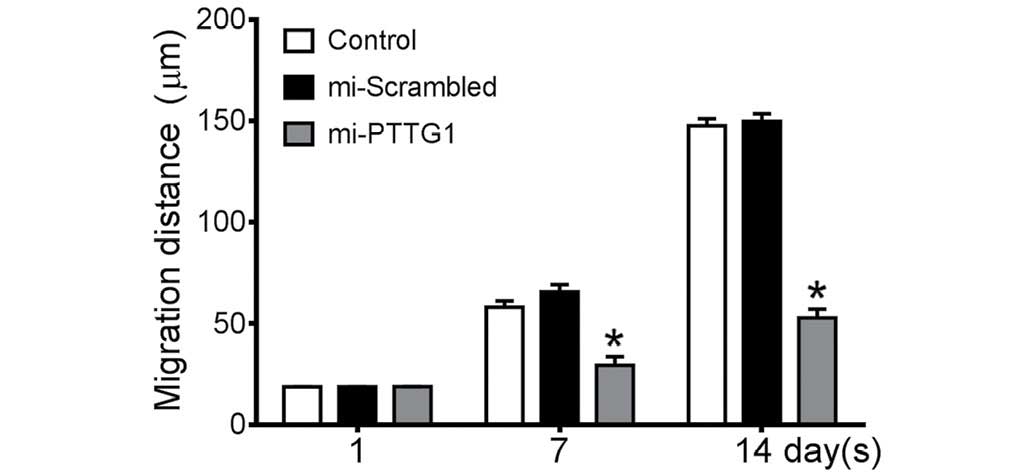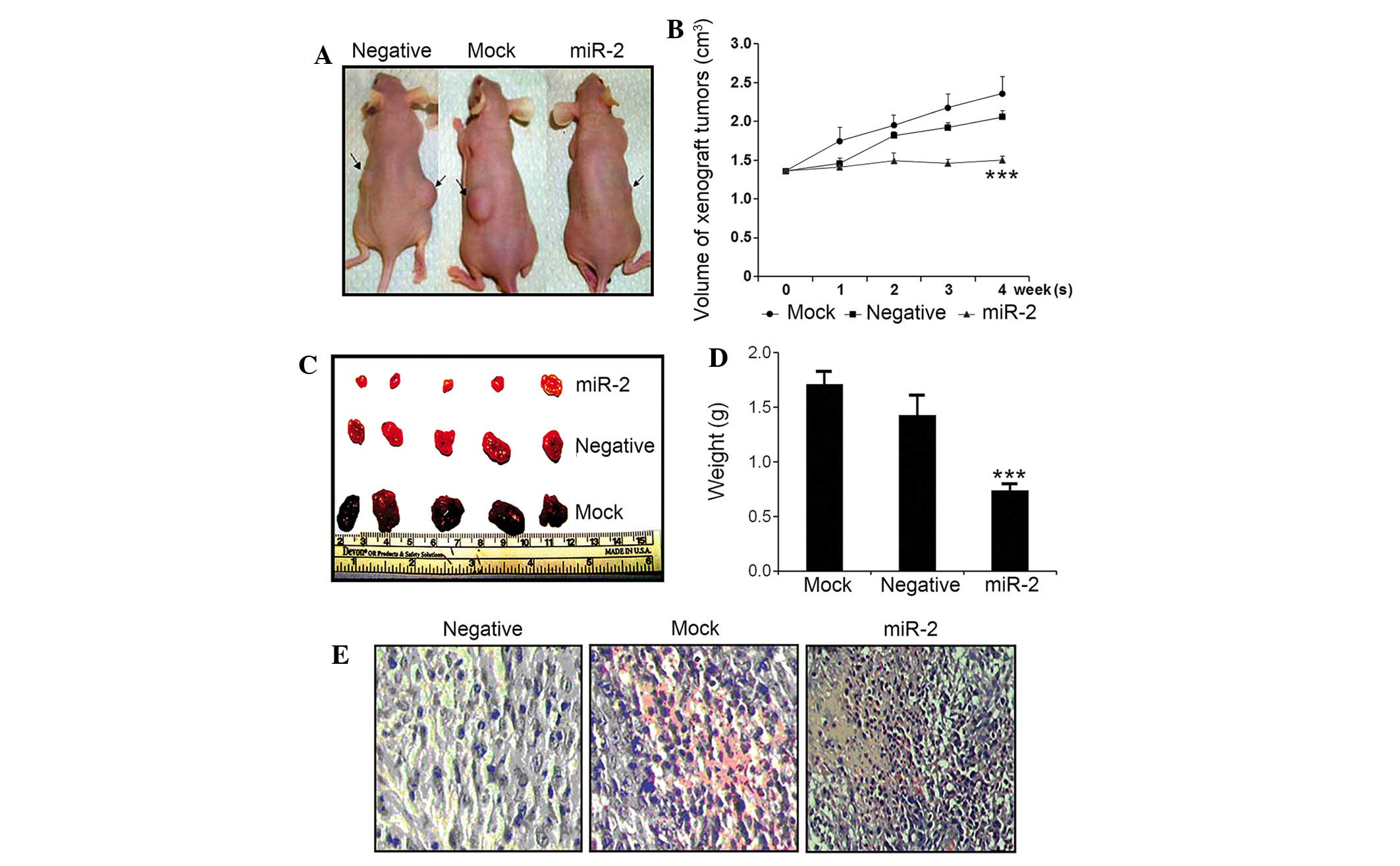|
1
|
Pei L and Melmed S: Isolation and
characterization of a pituitary tumor-transforming gene (PTTG). Mol
Endocrinol. 11:433–441. 1997. View Article : Google Scholar : PubMed/NCBI
|
|
2
|
Zhang X, Horwitz GA, Prezant TR, Valentini
A, Nakashima M, Bronstein MD and Melmed S: Structure, expression,
and function of human pituitary tumor-transforming gene (PTTG). Mol
Endocrinol. 13:156–166. 1999. View Article : Google Scholar : PubMed/NCBI
|
|
3
|
Puri R, Tousson A, Chen L and Kakar SS:
Molecular cloning of pituitary tumor transforming gene 1 from
ovarian tumors and its expression in tumors. Cancer Lett.
163:131–139. 2001. View Article : Google Scholar : PubMed/NCBI
|
|
4
|
Kakar SS, Chen L, Puri R, Flynn SE and
Jennes L: Characterization of a polyclonal antibody to human
pituitary tumor transforming gene 1 (PTTG1) protein. J Histochem
Cytochem. 49:1537–1546. 2001. View Article : Google Scholar : PubMed/NCBI
|
|
5
|
Chamaon K, Kirches E, Kanakis D,
Braeuninger S, Dietzmann K and Mawrin C: Regulation of the
pituitary tumor transforming gene by insulin-like-growth factor-I
and insulin differs between malignant and non-neoplastic
astrocytes. Biochem Biophys Res Commun. 331:86–92. 2005. View Article : Google Scholar : PubMed/NCBI
|
|
6
|
Vlotides G, Cruz-Soto M, Rubinek T, Eigler
T, Auernhammer CJ and Melmed S: Mechanisms for growth
factor-induced pituitary tumor transforming gene-1 expression in
pituitary folliculostellate TtT/GF cells. Mol Endocrinol.
20:3321–3335. 2006. View Article : Google Scholar : PubMed/NCBI
|
|
7
|
Lewy GD, Ryan GA, Read ML, Fong JC, Poole
V, Seed RI, Sharma N, Smith VE, Kwan PP, Stewart SL, et al:
Regulation of pituitary tumor transforming gene (PTTG) expression
and phosphorylation in thyroid cells. Endocrinology. 154:4408–4422.
2013. View Article : Google Scholar : PubMed/NCBI
|
|
8
|
Pei L: Activation of mitogen-activated
protein kinase cascade regulates pituitary tumor-transforming gene
transactivation function. J Biol Chem. 275:31191–31198. 2000.
View Article : Google Scholar : PubMed/NCBI
|
|
9
|
Solbach C, Roller M, Peters S, Nicoletti
M, Kaufmann M and Knecht R: Pituitary tumor-transforming gene
(PTTG): A novel target for anti-tumor therapy. Anticancer Res.
25:121–125. 2005.PubMed/NCBI
|
|
10
|
Qin B, Yang H and Xiao B: Role of
microRNAs in endothelial inflammation and senescence. Mol Biol Rep.
39:4509–4518. 2012. View Article : Google Scholar : PubMed/NCBI
|
|
11
|
Saito Y and Jones PA: Epigenetic
activation of tumor suppressor microRNAs in human cancer cells.
Cell Cycle. 5:2220–2222. 2006. View Article : Google Scholar : PubMed/NCBI
|
|
12
|
Lewis BP, Burge CB and Bartel DP:
Conserved seed pairing, often flanked by adenosines, indicates that
thousands of human genes are microRNA targets. Cell. 120:15–20.
2005. View Article : Google Scholar : PubMed/NCBI
|
|
13
|
Livak and Schmittgen, . Analysis of
relative gene expression data using real-time quantitative PCR and
the 2-ΔΔCt method. Methods. 25:402–408. 2001. View Article : Google Scholar : PubMed/NCBI
|
|
14
|
Burger M, Hartmann T, Burger JA and
Schraufstatter I: KSHV-GPCR and CXCR2 transforming capacity and
angiogenic responses are mediated through a JAK2-STAT3-dependent
pathway. Oncogene. 24:2067–2075. 2005. View Article : Google Scholar : PubMed/NCBI
|
|
15
|
Xia L, Huang Q, Nie D, Shi J, Gong M, Wu
B, Gong P, Zhao L, Zuo H, Ju S, et al: PAX3 is overexpressed in
human glioblastomas and critically regulates the tumorigenicity of
glioma cells. Brain Res. 1521:68–78. 2013. View Article : Google Scholar : PubMed/NCBI
|
|
16
|
Lettau I, Hattermann K, Held-Feindt J,
Brauer R, Sedlacek R and Mentlein R: Matrix metalloproteinase-19 is
highly expressed in astroglial tumors and promotes invasion of
glioma cells. J Neuropathol Exp Neurol. 69:215–223. 2010.
View Article : Google Scholar : PubMed/NCBI
|
|
17
|
Heaney AP, Singson R, McCabe CJ, Nelson V,
Nakashima M and Melmed S: Expression of pituitary-tumour
transforming gene in colorectal tumours. Lancet. 355:716–719. 2000.
View Article : Google Scholar : PubMed/NCBI
|
|
18
|
Horwitz GA, Miklovsky I, Heaney AP, Ren SG
and Melmed S: Human pituitary tumor-transforming gene (PTTG1) motif
suppresses prolactin expression. Mol Endocrinol. 17:600–609. 2003.
View Article : Google Scholar : PubMed/NCBI
|
|
19
|
Mora-Santos M, Castilla C, Herrero-Ruiz J,
Giráldez S, Limón-Mortés MC, Sáez C, Japón MÁ, Tortolero M and
Romero F: A single mutation in Securin induces chromosomal
instability and enhances cell invasion. Eur J Cancer. 49:500–510.
2013. View Article : Google Scholar : PubMed/NCBI
|
|
20
|
Huang SQ, Liao QJ, Wang XW, Xin DQ, Chen
SX, Wu QJ and Ye G: RNAi-mediated knockdown of pituitary
tumor-transforming gene-1 (PTTG1) suppresses the proliferation and
invasive potential of PC3 human prostate cancer cells. Braz J Med
Biol Res. 45:995–1001. 2012. View Article : Google Scholar : PubMed/NCBI
|
|
21
|
Kim D, Pemberton H, Stratford AL, Buelaert
K, Watkinson JC, Lopes V, Franklyn JA and McCabe CJ: Pituitary
tumour transforming gene (PTTG) induces genetic instability in
thyroid cells. Oncogene. 24:4861–4866. 2005. View Article : Google Scholar : PubMed/NCBI
|
|
22
|
Hueber A, Winter S and Weller M:
Chemotherapy primes malignant glioma cells for CD95 ligand-induced
apoptosis up-stream of caspase 3 activation. Eur J Pharmacol.
352:111–115. 1998. View Article : Google Scholar : PubMed/NCBI
|
|
23
|
Tseng SH, Wang CH, Lin SM, Chen CK, Huang
HY and Chen Y: Activation of c-Jun N-terminal kinase 1 and caspase
3 in the tamoxifen-induced apoptosis of rat glioma cells. J Cancer
Res Clin Oncol. 130:285–293. 2004. View Article : Google Scholar : PubMed/NCBI
|
|
24
|
Shinoura N, Muramatsu Y, Yoshida Y, Asai
A, Kirino T and Hamada H: Adenovirus-mediated transfer of caspase-3
with Fas ligand induces drastic apoptosis in U-373MG glioma cells.
Exp Cell Res. 256:423–433. 2000. View Article : Google Scholar : PubMed/NCBI
|
|
25
|
Qi H, Chen HZ and Jin ZJ: Caspase 3 gene
expression and [Ca2+]i homeostasis underlying desipramine-induced
C6 glioma cell apoptosis. Acta Pharmacol Sin. 23:803–807.
2002.PubMed/NCBI
|
|
26
|
Higuchi Y and Yoshimoto T: Arachidonic
acid converts the glutathione depletion-induced apoptosis to
necrosis by promoting lipid peroxidation and reducing caspase-3
activity in rat glioma cells. Arch Biochem Biophys. 400:133–140.
2002. View Article : Google Scholar : PubMed/NCBI
|
|
27
|
Beretta F, Bassani S, Binda E, Verpelli C,
Bello L, Galli R and Passafaro M: The GluR2 subunit inhibits
proliferation by inactivating Src-MAPK signalling and induces
apoptosis by means of caspase 3/6-dependent activation in glioma
cells. Eur J Neurosci. 30:25–34. 2009. View Article : Google Scholar : PubMed/NCBI
|
|
28
|
Kugler W, Buchholz F, Köhler F, Eibl H,
Lakomek M and Erdlenbruch B: Downregulation of Apaf-1 and caspase-3
by RNA interference in human glioma cells: Consequences for
erucylphosphocholine-induced apoptosis. Apoptosis. 10:1163–1174.
2005. View Article : Google Scholar : PubMed/NCBI
|
|
29
|
Zhou X, Zhang J, Jia Q, Ren Y, Wang Y, Shi
L, Liu N, Wang G, Pu P, You Y and Kang C: Reduction of miR-21
induces glioma cell apoptosis via activating caspase 9 and 3. Oncol
Rep. 24:195–201. 2010.PubMed/NCBI
|
|
30
|
Yin D, Tamaki N and Kokunai T: Wild-type
p53-dependent etoposide-induced apoptosis mediated by caspase-3
activation in human glioma cells. J Neurosurg. 93:289–297. 2000.
View Article : Google Scholar : PubMed/NCBI
|















